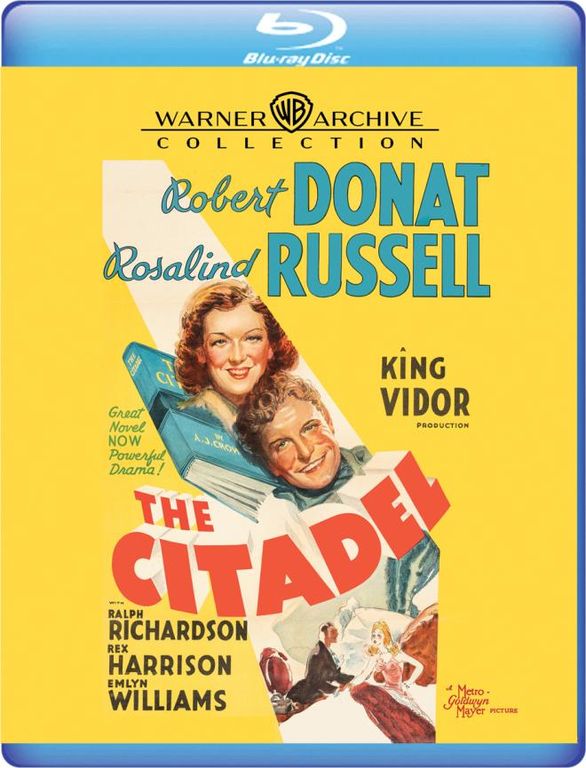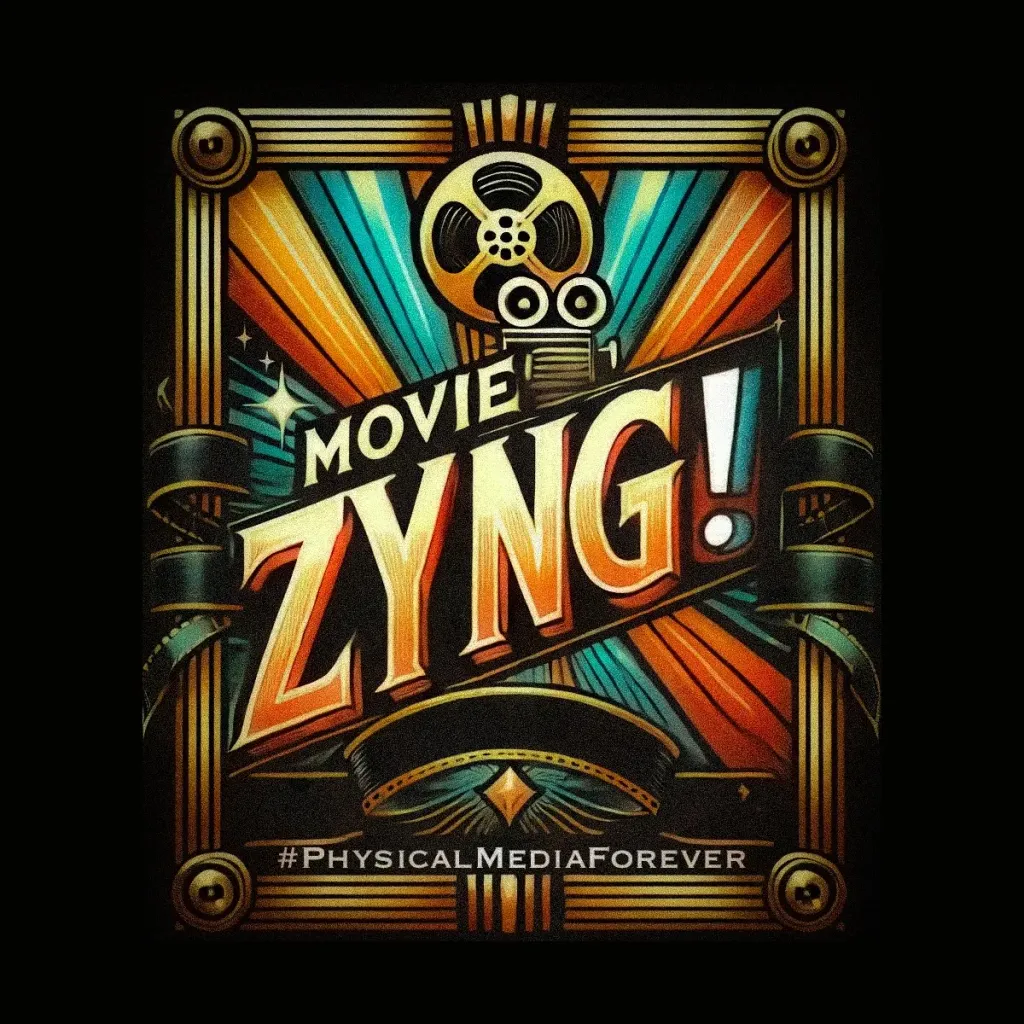The Citadel Blu-ray Review
Warner Archive Collection
Score: 75
from 2 reviewers
Review Date:
Vidor’s Oscar-nominated drama endures; Warner Archive’s Blu-ray delivers a 4K scan, remastered audio, and vintage extras with sterling clarity.
Our Stores
Our stores are dedicated, independent and share our values and love for physical media.
Video: 81
Sourced from 4K scans, this faithful 1.37:1 1080p/AVC presentation looks superb: intact grain, rich blacks, crisp whites, nuanced grays, and strong shadow detail with striking texture and depth. Minor softness from mixed elements and a few masked missing frames scarcely distract.
Audio: 86
The DTS-HD Master Audio 2.0 mono track delivers clear, well-balanced fidelity: dialogue is crisp and well-prioritized, Levy’s score fills the room, and effects—train whistles, ticking clocks, bassy explosions and mine rumbles—land with depth, with no hiss, pops, crackle, or flutter.
Extra: 46
A modest, well-curated bundle: two 1938 Jacques Tourneur one-reel “historical mysteries” (SD, ~10 min each), the Looney Tunes The Daffy Doc with Porky/Daffy (HD, ~7 min), and the original trailer (SD). Vintage charm with tidy presentation and context.
Movie: 76
Vidor’s The Citadel remains a compelling, ethically charged melodrama—authentic in coal-town grit and buoyed by Donat, Richardson, and Russell—even if the London detour sags. Blu-ray delivers a crisp 1080p/AVC image, clean DTS‑HD MA 2.0 mono, and no previews.

Video: 81
The Citadel’s video presentation benefits from a brand-new HD master sourced from 4K scans of the best available preservation elements, yielding a notably clean 1080p/AVC MPEG‑4 encode in the film’s original 1.37:1 framing. Grayscale is impressively rendered, with rich, stable blacks, crisp whites, and finely stepped midtones that produce a natural sense of depth. The intact, unobtrusive grain structure preserves the film-like texture and the integrity of Harry Stradling Jr.’s cinematography, while shadow delineation is strong, lending clarity to nocturnal passages and the sootier mine interiors. Fine detail in faces, fabrics, and background architecture is consistently distinct, and visible print damage is effectively neutralized.
There is occasional, source-related softness that never undermines overall sharpness, and a brief instance of missing frames (one or two) appears mid-to-late in the feature—momentarily noticeable but discreetly handled. Otherwise, stability is high, contrast remains balanced, and the image holds together well across bright and low-light scenes, with close-ups retaining pleasing texture and dimensionality. Authoring is clean, and the feature is divided into 26 chapters. Overall, this transfer represents a significant restoration lift for the title, offering a refined, film-faithful presentation that maximizes the strengths of the 4K-scanned elements within the 1080p format.
Audio: 86
The DTS-HD Master Audio 2.0 mono presentation is clean, well-modulated, and impressively full for a period track. Dialogue is consistently prioritized and easily intelligible, riding a stable center with no sibilance or congestion. Louis Levy’s score exhibits excellent fidelity, scaling confidently to room-filling levels without strain, while bass extension—within the constraints of a mono mix—adds palpable weight to set pieces. Sonic accents, from train whistles to the delicate tick of a clock, register with crisp precision, preserving transient detail and maintaining strong separation within the mono field.
Effects-heavy passages retain composure and impact: explosions in the sewer and the rumblings in the mine arrive with convincing low-end presence and controlled decay, free of muddiness. The noise floor remains admirably low, with no intrusive hiss, pops, crackle, or flutter, and the track shows no age-related distortion or warble. Overall balance among dialogue, music, and effects is thoughtfully engineered, yielding an authentic, period-appropriate experience that feels lively, textured, and artifact-free while respecting the film’s original mono intent.
Extras: 46
A compact, well-curated extras suite balances historical value with variety. Two 1938 one-reelers—both directed by Jacques Tourneur—arrive in SD and hold contextual interest, while a crisp HD Looney Tunes short adds levity and early-series significance. The original SD trailer rounds out the package. Runtimes align with archival sources, and transfers are clean for their age, with the cartoon receiving the sharpest presentation.
Extras included in this disc:
- The Ship That Died: SD, ~10 min (1938). Tourneur “historical mystery” speculating on the Mary Celeste.
- Strange Glory: SD, ~11 min (1938). Tourneur short on the Civil War’s Tennessee Plan; includes a Byron Foulger bit.
- The Daffy Doc: HD, ~7 min (1938). B&W Looney Tunes; Porky stars, early standout turn for Daffy.
- Theatrical Trailer: SD, ~5 min. Lengthy original preview.
Movie: 76
Adapted in 1938 from A.J. Cronin’s National Book Award–winning novel, The Citadel charts Dr. Andrew Manson’s arc from rigorous idealism to corrosive materialism and back, using a Welsh coal-mining community—and later London society—as clinical case studies in medical ethics. Early passages are vivid and propulsive: Manson confronts measles, typhoid, and a stillbirth revival while probing the health dangers of coal dust, running afoul of miners, quacks, and bureaucrats. King Vidor’s Oscar-nominated direction delivers harrowing set pieces—a descent into an unstable mine, tense board hearings that jeopardize Manson’s license, and a fraught operation on his colleague Dr. Philip Denny—anchoring the film’s critique of profit-driven practice with procedural rigor. The episodic structure both clarifies the professional fault lines and saps momentum once Manson succumbs to London’s hypochondriac elite, though the film’s moral recalibration remains sharply observed.
Performances are uniformly strong and carefully modulated. Robert Donat’s nuanced turn captures a principled physician seduced by status, earning an Academy Award nomination; Rosalind Russell, playing against her later screwball profile, gives Christine a steadying intelligence and emotional ballast. Ralph Richardson’s Denny is incisive and combustible; Rex Harrison deftly embodies the seductive ease of fashionable medicine. Produced by MGM in partnership with Denham Studios, the film retains a distinct British sensibility and was a major commercial success, taking in roughly $2.5 million and earning four Academy Award nominations (Best Picture, Director, Actor, Screenplay). Its impact extended beyond cinema, with Cronin’s exposé frequently cited as influential in the evolution of Britain’s National Health Service. A studio disclaimer foregrounds respect for medicine, yet the film’s candid portrait of misconduct and institutional complacency feels strikingly contemporary, balancing censure with genuine admiration for clinicians who uphold the vocation’s core obligations.
Total: 75
Enduring both as a prestige drama and an incisive look at medical ethics, The Citadel remains potent decades on. King Vidor’s direction keeps the narrative lean and urgent, while Robert Donat and Rosalind Russell anchor the film with nuanced, empathetic performances that underscore its still-relevant critique of professional compromise. The film’s historical stature—nominated for four 1938 Academy Awards including Best Picture, Best Director, and Best Actor—aligns with its continued resonance and accessibility.
The Blu-ray presentation is thoughtfully executed. Sourced from a 4K scan of the best surviving preservation elements, the image exhibits strong detail, stable grain, and convincing grayscale, yielding a clean, film-like presentation without over-processing. Remastered audio delivers clear dialogue, balanced dynamics, and low noise, supporting the dramatic intensity without distortion. A small but welcome selection of vintage supplements contextualizes the production and era. Taken together, this disc offers an attractive facelift and a respectful archival treatment, making it a fitting addition for classic cinema collections.
- Read review here

High-Def Digest review by
Video: 80
A couple of missing frames toward the end of the film are noticeable, but masterfully masked, and though some softness is occasionally evident due to the multiple sources used, the instances aren't particularly...
Audio: 80
Excellent fidelity brings the music score to life and helps it easily fill the room, while solid bass frequencies add palpable depth to the explosions in the sewer and rumblings in the mine....
Extras: 40
Vintage Short: The Ship That Died (SD, 10 minutes) - Billed as "An Historical Mystery," this one-reeler - directed by Jacques Tourneur a few years before he would move on to features and make a splash...
Movie: 80
But when the action shifts to London and Andrew embraces the attitudes he used to loathe and gets sucked into the cushy, dull life of a high-class doctor, the film loses some of its steam....
Total: 80
A prestige picture that still makes relevant points about the medical profession more than eight decades after its premiere, The Citadel mixes strong messaging with absorbing drama....
- Read review here

Home Theater Forum review by Matt Hough
Video: 90
There are one or two missing frames in one sequence midway through the film which are rather startling when they occur, but otherwise the image is all one could wish for a film of this age....
Audio: 100
Dialogue has been beautifully recorded and has been combined with Louis Levy’s music and the appropriate sound effects into a most effective sound package....
Extras: 60
Live Action Shorts (SD): two 1938 one-reel “historical mysteries” directed by Jacques Tourneur – The Ship That Died (10:09) and Strange Glory (10:37)....
Movie: 80
Among the more impressively helmed sequences are a traumatic excursion deep into an unstable mine shaft with the doctor trying to save a man trapped and risking his own life in the process, several interviews...
Total: 80
Nominated for four 1938 Academy Awards including Best Picture, Best Director, and Best Actor, King Vidor’s The Citadel offers compelling viewing even more than eighty years after its initial release....
Director: King Vidor
Actors: Robert Donat, Rosalind Russell, Ralph Richardson
PlotA newly qualified, idealistic doctor arrives in a Welsh mining town determined to tackle disease and suffering. Faced with rampant tuberculosis, cramped housing, industrial injury and an indifferent local establishment, he finds medical resources scarce and public health infrastructure broken. He runs a primitive clinic, performs make-do treatments for exhausted miners and sick children, and pushes for basic preventative measures against infection. His precise clinical skill and moral urgency win him gratitude but also provoke hostility from mine managers, local officials and colleagues invested in the status quo. Weekly surgeries, house calls into coal-stained cottages and grim hospital wards expose the human toll of poverty and the limits of one practitioner's influence.
Working alongside a principled nurse and a handful of sympathetic doctors, he establishes friendships and encounters philosophies that sharpen his convictions. He confronts bureaucratic indifference, professional rivalries and the ethical question of whether to fight for systemic reform or accept small, immediate relief. Personal bonds grow as he learns to balance clinical care with public advocacy, and the strain of constant exposure to suffering begins to test his temperament and ideals. The story sets up an escalating clash between conscience and compromise, leaving the central character poised at a difficult crossroads.
Writers: Ian Dalrymple, Frank Wead, Elizabeth Hill
Runtime: 110 min
Rating: Passed
Country: United Kingdom
Language: English




